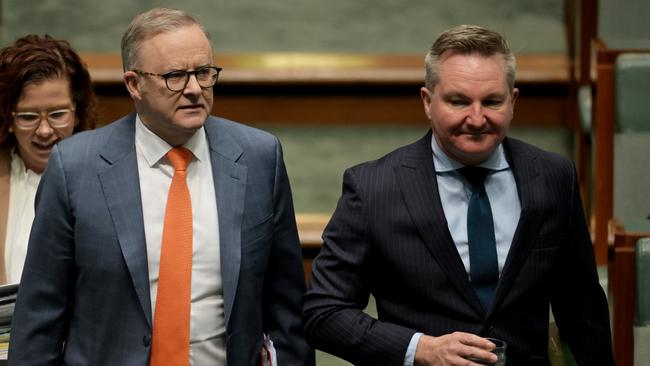Anthony Albanese may stall on unveiling 2035 climate target
Anthony Albanese could delay unveiling his 2035 emissions reduction target, with investors lowering their expectations of a pre-election announcement.

Anthony Albanese could delay unveiling his 2035 emissions reduction target beyond the government’s February deadline, with investors lowering their expectations of a pre-election announcement amid global uncertainty on climate ambition.
Investors are calling on the government to announce a “strong” 2035 target before the end of next year, meaning there are no hard expectations the target will be set before the Prime Minister goes to the polls. The federal election is due by May.
Climate Change and Energy Minister Chris Bowen’s spokeswoman left open the possibility of unveiling the target after February, instead pointing out Peter Dutton didn’t have a target for 2030 “let alone a plan for 2050”.
When asked by The Australian if the government would stick to its February deadline, the spokeswoman said: “The Albanese government is working to bring down energy prices and emissions after a decade of delay, dysfunction and denial – but our progress is precarious.
“Experts agree that the cheapest and fastest way to meet our targets and secure our energy needs as coal retires is to roll out renewables. That is exactly what the Albanese government is delivering.”
The Department of Climate Change, Energy, the Environment and Water notes countries must update their nationally determined contribution under the Paris Agreement every five years, with each target to be more ambitious than the last. “Australia’s updated NDC will include the 2035 target and is due by the end of February 2025,” it states.
Politicians, investors and the business community are closely watching the November US election, which is expected to influence what actions other countries take on climate change.
There are concerns among climate progressives that if Donald Trump is re-elected, there will be less urgency in setting 2035 targets after he pulled out of the Paris Agreement when last in power.
The rise of conservative parties in Europe may also stall ambition if countries aren’t ready to put forward their 2035 goals.
As the Climate Change Authority prepares to release a review into what actions key sectors could take to reach net zero by 2050, Investor Group on Climate Change policy managing director Erwin Jackson said businesses needed stability.
“Investors are looking for all governments to announce strong 2035 climate targets well before the COP in Brazil at the end of next year,” he said.
“Failing to act on climate change will make the job of Australian farmers, businesses, communities and investors even harder as they face more extreme weather events and an increasingly volatile future.”
The Opposition Leader has rejected a possible 2035 emissions reduction target of 65-75 per cent below 2005 levels, which the CCA says would be ambitious but achievable if additional action was taken, and is refusing to take any medium-term targets to the election.
Tennant Reed, Australian Industry Group director of climate change and energy, said making a decision past February on the 2035 target “would not be the end of the world” but the “drop-dead date” was the end of next year.
“Domestically we have a major review of the safeguard mechanism in 2026 that needs the guidance of the target,” he said.
“Internationally everyone is expected to have their target lodged ahead of COP30 in Brazil in November next year.
“Reaching a decision well ahead of the end of 2025 would be much better; going past that point would make for big trouble.”
Australian Chamber of Commerce and Industry chief executive Andrew McKellar said if the Albanese government wasn’t required to unveil its 2035 target in February or March, it should “use whatever flexibility it has in terms of timing” within the scope of the Paris accord.
“We want certainty, we think that it’s important the Australian government does elaborate its targets for 2035. They must be realistic, they must be practical and achievable targets and they must provide reliability and affordability in terms of energy supply for business and the economy generally,” Mr McKellar said.
Robeco head of active ownership Peter van der Werf said setting an ambitious 2035 target would “further strengthen” Australia’s appeal to international investors who might otherwise look elsewhere.
Robeco has about $320bn in assets under management.
“There are many geopolitical considerations, including elections in the US, that could significantly weigh on timing of the NDC target announcement by Australia. We respect that the government needs to find the right time with the necessary political mandate to publish an NDC target that is achievable and ambitious at the same time,” Mr van der Werf said.
Andrew Lill, chief investment officer at Rest, which manages the super of more than 1.9 million Australians, including more than 1 million aged under 30, said climate change and supporting the transition to net zero mattered to its members.
In an online survey of 2304 members, which was conducted by Redbridge from 1 to 16 July, 86 per cent said it was important the super fund invest in and support renewable energy and other sustainable initiatives.
“It’s materially important for investors like Rest to have a clear and ambitious Australian emission reductions target for 2035, and supporting policy frameworks. These will help bring certainty to the market and signal a more certain investment landscape,” Mr Lill said.
Australian Ethical chair Steve Gibbs said corporate Australia wanted to invest capital today to set Australia up for the “least cost and greatest benefit transition”, which required policy certainty, such as clear and unchanging targets for 2030 and 2035.




To join the conversation, please log in. Don't have an account? Register
Join the conversation, you are commenting as Logout